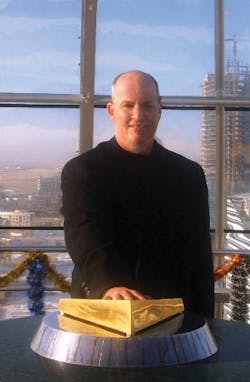Peter Unger
Professional
A2LA President/CEO, 1996-Present
A2LA Vice President, 1986-1996
American Association for Laboratory Accreditation (A2LA)
Frederick, MD
Engineer, General Services Administration,
U.S. Department of Commerce
and National Bureau of Standards
(National Institute for Standards and Technology)
Education
BS, Systems Engineering
Princeton University;
MS, R&D Management
George Washington University
Personal
Enjoys gym workouts, golf, and gardening between international trips.
Proud parent of a University of Michigan (double major) graduate
and a Valley Forge Military Academy student.
Volunteers time to organization that provides hearing devices
to the hearing impaired and cochlear-implant candidates.
Tool of trade. As a non-profit, membership society established in 1978, A2LA was the
first comprehensive multidiscipline laboratory-accreditation system in
the United States to offer accreditation for all types of testing. We
now have 2,000 accreditations in all fields of testing. A2LA has been
offering accreditation for medical labs since 2007. In the future, I
expect governments to increasingly rely on laboratory accreditation as a
regulatory tool to provide confidence in the reliability of data used to
make health, safety, and quality decisions. International trade
agreements will increasingly use laboratory accreditation as a
trade-facilitation tool.
International recognition. Accreditation to International Organization for Standardization (ISO)
15189 is gaining traction in the medical-laboratory community within the
United States. The rest of the developed world is much further along.
ISO 15189 is the management-system-based standard for medical-testing
laboratories that can result in higher productivity and efficiency. A2LA
was the first accreditation body in the United States to launch a
program to accredit to ISO 15189. A2LA is the first accreditation body
to pursue deemed status for a program that combines ISO 15189 and
the Clinical Laboratory Improvement Amendments (CLIA) regulations.
Competency counts. A2LA's ISO 15189 program is internationally recognized under the Mutual
Recognition Arrangement of the International Laboratory Accreditation
Cooperation (ILAC); A2LA's CLIA program is not recognized under this
arrangement. A2LA uses independent, impartial contracted assessors, and
accreditation is based upon the scope, size, and number of assessor days
— not on the number of samples handled by the laboratories.
Measurement-traceability requirements are more stringent in that the
medical laboratories must use accredited calibration laboratories.
Measurement-uncertainty estimates are required for in-house
calibrations. The laboratory must maintain an effective
quality-management system to ensure continued competence.
Cooperative spirit. A2LA is a leader in developing national and global cooperation as well
as standards in laboratory accreditation. I serve as ILAC vice chair and
the InterAmerican Accreditation Cooperation's (IAAC's) technical
advisor. Roxanne Robinson, our vice president and COO, serves on the
Asia-Pacific laboratory Accreditation Cooperation (APLAC) board of
management, and Trace McInturff, our operations manager, serves as the
chair of the APLAC technical committee. Many other A2LA staff members
and assessors contribute their time to serve in various positions, both
nationally and internationally, including as peer evaluators of other
accreditation bodies for ILAC, APLAC, and IAAC and as members of several
standards-writing committees. A2LA is a strong believer in involving
staff in these endeavors as a continuing growth and learning experience,
which not only benefits the individual but the company and the greater
accreditation community as well.
Keeping up with change. If a lab meets the requirements of ISO 15189 through A2LA, it will have
policies and procedures for keeping up with staff and document changes.
These will be assessed as a part of the accreditation process. We also
offer training courses to acquaint laboratory personnel with the
requirements for accreditation, so there are no surprises.


